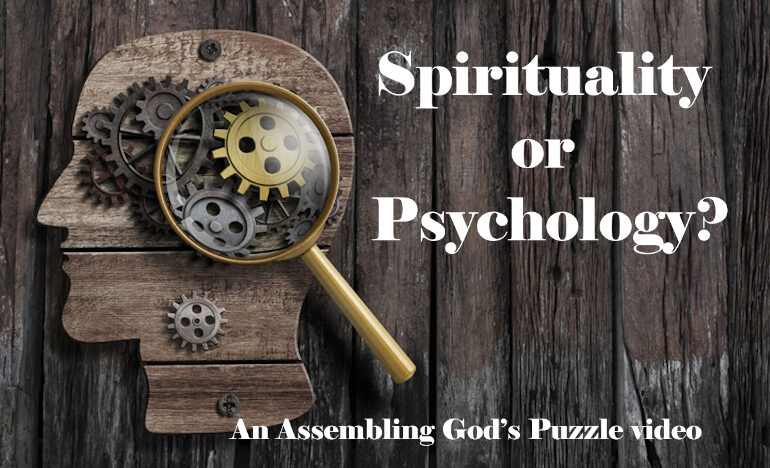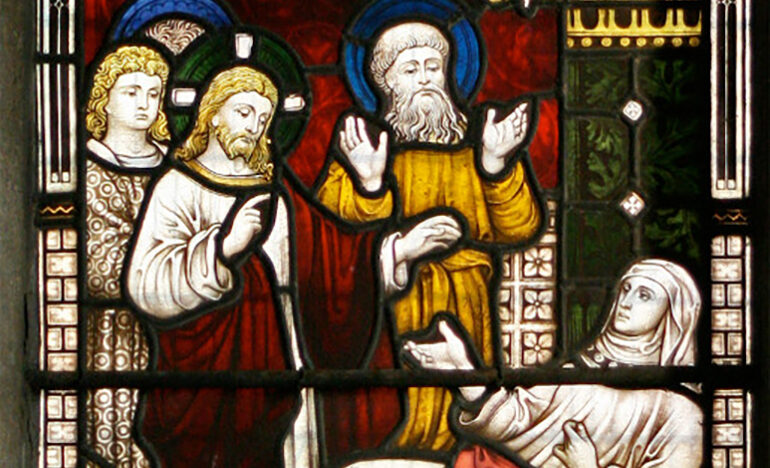Spirituality or Psychology?

An Assembling God’s Puzzle video
By Fr. Garry Richmeier, C.PP.S.
Some people come to me for spiritual direction. Others come to me for counseling. And sometimes someone will come to me unsure about which they are looking for. What is the difference between these two?
To me there is very little substantial difference between spiritual direction and counseling. For me, it is basically a matter of what language is used in helping a person deal with life issues.
In counseling, psychological language is commonly used. Things like anxiety, depression, effective communication between spouses, trauma, self-esteem, and so on, are discussed.
In spiritual direction, “spiritual” language is used, like relationship with God, prayer life, morality, virtues, sin, and so on. On the surface, counseling and spiritual direction may look and sound different, but each is dealing with the same exact thing: human life experience.
A simple (simplistic?) definition of psychology is how a person views, perceives, and thinks about the world, which then affects how they behave or live. In this sense, everything is included under the umbrella of psychology, including how a person views or thinks about God or spirituality or religion. We human beings cannot have a view of God or Spirit without that view being affected by our upbringing, what we were taught, our life experiences, our cultural background, our gender, sexual orientation, etc. All of that creates our psychological make-up, from which we draw our views about everything — people, the environment, right and wrong, God, religion, and so on. Our actions and behavior follow from that.
Whether a person comes to me for spiritual direction or counseling, I know that I will be helping them deal with their perception of their world, possibly adjusting it to be more accurate and helpful, which hopefully will result in behavior that makes life better for them and others around them.
Here is an example of how psychology and spirituality are the same. The word “father” brings up all kinds of images and connotations for each of us. For me it reminds me of my father who loved me, was a pretty good teacher, but was often short on patience. Those images come to mind when I think of father. For another person, the word “father” may bring up memories and images of physical abuse. We all have our own thoughts, images, and ideas which accompany that word.
What happens when we call God our Father? We cannot think about God as Father without our “psychology” coming into play and coloring how we describe and relate to God. So for the ancient Israelites, whose safety was often threatened by neighboring tribes, they saw God the Father as very much a God of power and might who defeated their enemies. Jesus called God “Abba,” or daddy. A very different image of father.
Both religion and psychology tend to draw distinctions between the right and the wrong way to see things. Psychology does this by putting some diagnosis on people who think and behave in the “wrong” way. Religions label people as heretics or unfaithful if they have different views of God or religion.
I have never been very successful in helping people (or myself) by telling them they are wrong in how they look at things. What I have found helpful in working with people is, first of all, understanding how a person came to their particular view of life, the world, themselves, God, or whatever. That means honoring that view, and understanding that they came by it honestly through their life experience. Then I listen for how that particular view has caused them problems.
For example, seeing all men (including God) as threats can be a view that is problematic for a person. Only after understanding the person in this way, and clearly communicating to them that I understand, am I in a position to help them explore a different way of viewing things which might cause them fewer problems.
We don’t have to be counselors, therapists, or spiritual directors to help people in this way. All we need is an openness to listening to a person, and understanding how they look at life, people, or God, even when it is very different than ours. That develops trust in relationship. Only then will we be in a better position to propose other ways to view things which might be more helpful to them. But the goal must always be compassion for the person, and a desire to ease their suffering, rather than correcting, judging, or “straightening them out.”
Appreciating and honoring the many different world-views among us, even when we don’t hold the same views, is a powerful way we can work toward healing in today’s polarized world.
All of the videos in this series can be found here: Assembly God’s Puzzle.
Never miss an article published on the Renewal Center website: Sign up to receive our newsletters.
[Fr. Garry Richmeier, a Precious Blood priest and spiritual director, holds a Master’s of Divinity Degree from St John’s University in Collegeville, Minnesota, and a Master’s of Counseling Psychology degree from the University of Missouri-Kansas City. He is a licensed professional counselor and a licensed marriage and family therapist.]
Photo 85553737 | Psychology © Andreykuzmin | Dreamstime.com
Related

Making a Banner for Lent Part 2
A Coffee with Padre Video
Fr. Timothy finishes his Lenten banner and continues his reflections on how colors and materials become potent symbols that bring the Lenten season alive. The final banner serves as a visual reminder of our spiritual journeys.

Lent Video Four — Guided Meditation: ‘Traveling in the Dust of the Rabbi’
In this video, Fr. Ron reads the Gospel, Mark 1:29-34, for you and then leads you through a guided meditation, taking you deeper into that story. He calls this experience “an example of traveling in the dust of the rabbi.”
Categories
Assembling God's Puzzle Coffee with Padre Cooking & Spirituality Encounters of the 4th Kind Family Matters Reflections on the Eucharsitic Prayers Spiritual Resources Taize Prayers The Contemplative Life Traveling with Pilgrims of Hope Uncategorized Videos Week of Prayer for Uhristian Unity When you need a little help
